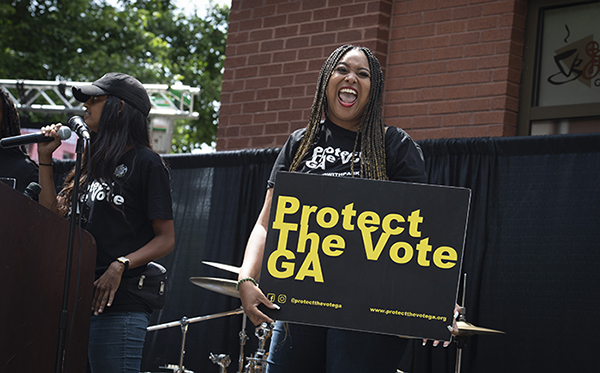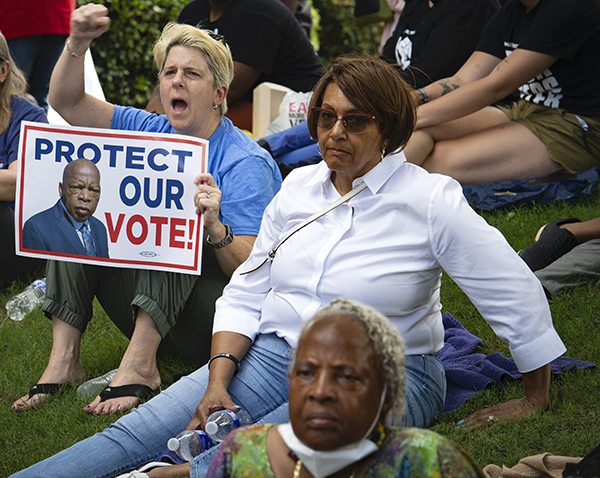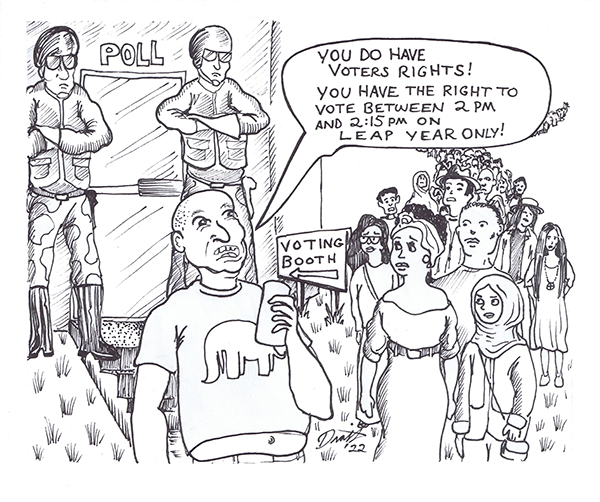
Photo: © Robin Rayne / ZUMA Press Wire
When Sen. Raphael Warnock (D-GA) stood on the Senate floor Jan. 19 gently but firmly demanding that the Senate rise to the occasion and pass legislation to protect the right to vote, he began by saying, “We have been summoned here by history….This is a moral moment.”
But 50 Republicans and two Democrats failed the moral test, voting to protect the powerful by limiting the people’s right to have their voices heard. This treacherous act was both an overt attack on the Black vote and voters of color generally, and an attack on everyone’s right to vote — an attack on democracy itself.
Yet there is still good news in what happened. The Republican Party as it now exists revealed itself even further as the enemy of democracy, and more fissures appeared between the progressives and the corporate wing of the Democratic Party, which offers hope for the future. What’s more, the defeat the people suffered in the Senate will no doubt spur the movement in the streets to redouble its efforts to defend and expand democracy.

Photo: © Robin Rayne / ZUMA Press Wire
It’s worth noting, for example, that when President Biden went to Atlanta to speak on voting rights prior to the Senate vote, some local grassroots leaders declined to attend. They said they were too busy registering voters to listen to more talk. And Democratic senators Manchin and Sinema have thoroughly exposed themselves.
Talk radio host Joe Madison began a hunger strike for voting rights on Nov. 8. As he announced on Jan. 20 that he was ending the hunger strike, he said, “What Republicans in the Senate and state legislatures have done is awaken a new generation of activists and advocates, and that generation now knows and it’s prepared to continue this struggle to protect our voting rights…. You have now awakened a sleeping giant. …And I say to the Democratic Party, I say to independents, now is the time to regroup, organize door to door and on the grassroot level. We didn’t get the votes in the Senate but we have awakened the minds, the hearts and the consciousness of a new generation.”
In an interview with Democracy Now! prior to the Senate vote, Bishop William Barber II, co-chair of the Poor People’s Campaign, said the effort to suppress voting rights reflects “the fear of the aristocracy of the masses of poor and low-wealth people, Black and white, coming together to vote in a way that fundamentally shifts the economic architecture of the nation. In fact, in 1967, Dr. King said, ‘We must also realize that the problems of racial injustice and economic injustice cannot be solved without a radical redistribution of political and economic power.’ So, first of all, we should have never decided to separate voting rights from economic justice.…That was a fundamental mistake, I believe, on many activists’ part and on many Democrats’ part, to separate these out. We should have started saying we demand the infrastructure of our democracy, which is voting, and the infrastructure of investment in the lives of poor and low-wealth people.”
Barber added: “We’ve been begging the president and his handlers to meet with moral leaders, white and Black and Brown and Latino, and impacted people in the White House. To make this a Black issue is dangerous. It’s not just a Black issue. Fifty-five million people will lose their access to the polls that they used in 2020, if we allow what’s going on to continue. It’s a democracy issue. Dr. King never framed this issue as just a Black issue. He always framed it as an economic issue and a race issue, and we should be doing the same.”
Barber called for “direct action, mobilization, and not for a day but for a season. We’re going to massively engage in registering voters and pushing out voters in poor and low-wealth communities who can fundamentally shift the political realities of this country.” The Poor People’s Campaign has called for a mass march on Washington and to the polls on June 18.
LaTosha Brown, co-founder of the Black Voters Matter Fund, said in an online program Jan. 14 that, “This isn’t just about, okay, we’ve got to win this vote and then everything will be fine. No, this is around we’ve got to have substantial structural change in this country….We have a system that is not lending itself for the fullness of democracy, as it is even laid out in the Constitution, that at the very least….At the end of the day, anytime people are punished because of how they voted, that in itself is the very definition of political corruption. And so we have to recognize that’s how democracies are unraveled and how they die.”
Tara Benally is with the Rural Utah Project, which works to register and empower voters in rural Utah. “What Senator Sinema has done has undermined all efforts,” she told the Arizona Mirror. “The Indigenous Nation has been left behind for so long that [Sinema] voting to not end the filibuster is undermining them.”
Lydia Camarillo, president of the Southwest Voter Registration Education Project told a reporter, “Anytime that there are laws that hurt rather than enhance participation in American democracy, it hurts.”
One of the hunger striking Arizona students told the media as the Senate debated, “We are on day 6 of our hunger strike … our future and lives stand in the balance. So we are out here escalating even further…we’re gonna keep on walking, talking. We have a lot of power as a people and we have the power to act, and that’s what we’re doing out here.”
Corporations have been funding the voter suppression drive. In 2020, companies including PayPal, Lyft, Johnson & Johnson, PepsiCo, U.S. Sugar Corporation, Microsoft, Walmart and Blue Cross Blue Shield Association collectively put hundreds of thousands of dollars into supporting voter suppression efforts by Republican state attorneys general across the country.
The corporations no doubt want to scuttle the voting rights bill in part because it would require disclosure of dark money donations to candidates and bar transferring funds between organizations to hide the identity of contributors. In 2021, the dark money conservative political action group Heritage Action described a $24 million plan to push voter suppression at the state level and to block federal action to protect voting rights. The U.S. Chamber of Commerce and the Koch brothers’ Americans for Prosperity also got behind voter suppression efforts last year.
For the first time ever, the U.S. was recently added to an international list of “backsliding democracies.” Make no mistake: the corporations are not playing. They mean to snuff out democracy altogether if they can. The point of attack is the rights of people of color, but the object of the attack is all of us, it is democracy itself. As Bishop Barber said, what is needed to counter the assault is “the greatest, largest mass movement of poor and low-wealth people in this country ever in history.”


